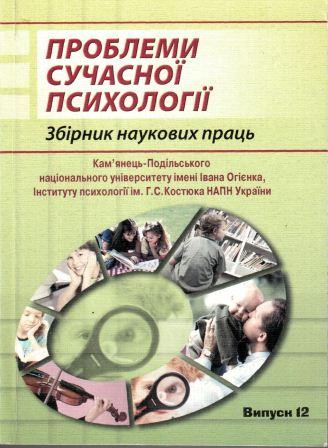Модель розвитку рефлексивного спілкування в студентів–психологів та критерії її виміру
DOI:
https://doi.org/10.32626/2227-6246.2011-12.%25pKeywords:
рефлексія, рефлексивне спілкування, конгруентність, емпатія, новоутворення.Abstract
У статті розглянуто структурнофункціональну модель розвитку
рефлексивного спілкування, розкриті структурні компоненти, описані
чотири етапи новоутворень цієї властивості,представлені критерії виміру
й рівнів готовності студентів застосувати рефлексивне спілкування в
професійній діяльності.
References
Андреева Г.М. Зарубежная социальная психология ХХ
столетия. Теоретические подходы: Учебное пособие для вузов /
Г.М.Андреева, Н.Н.Богомолова, Л.А.Петровская. – М.:
Аспект Пресс, 2001. – 288 с.
Гапоненко Л.О.Рефлексія як умова розвитку особистості:
монографія / Л.О.Гапоненко. Дніпропетровськ: Пороги,
– 175 с.
Емельянов Е.Н. Психологический анализ предметнореф
лексивных отношений в научной деятельности: Автореф.
Дис. …канд. психол. наук. – М., 1985. – 21 с.
Петровская Л.А. Теоретические и методические проблемы
социальнопсихологического тренинга / Л.А.Петровская. – М.:
МГУ, 1982. – 165 с.
Blumer H. sociological Implications of the Thought of G.H.Mead //
American Journal of Sociology. – V. 71. – 1966.
Kelley H.H.Thibaut J.W.The social Psychology of Groups. N.Y.,
Mead G.Mind, Self,Society. – Chicago, 1934.
Downloads
How to Cite
Issue
Section
License
Copyright
The Editorial Board has the full right to publish original scientific papers containing results of theoretical and experimental research works which are not currently subject to review for publication in other scientific editions. The Author shall transfer to the editorial board of the Collection the right to spread the electronic version of the paper, as well as the electronic version of the paper translated into English (for papers originally submitted in Ukrainian and Russian) by all kinds of electronic means (placement at the official website of the Collection, electronic databases, repositories etc).
The Author of an article reserves the right to use materials of the paper, without approval with the editorial board and the founders of this Collection: a) partially or fully, for educational purposes; b) for writing own dissertation papers; c) for preparation of abstracts, conference reports and presentations.
The Author of an article can place electronic copies of the paper (including the final electronic version downloaded from the official website of the Collection) at:
- personal web resources of all Authors (websites, webpages, blogs etc.);
- web resources of the institutions where the Authors are employed (including electronic institutional repositories);
- non-profit public access web resources (for example, arXiv.org).
But in all cases, it is obligatory to have a bibliographic reference to the paper, or a hyperlink to its electronic copy placed at the official website of this Collection.






